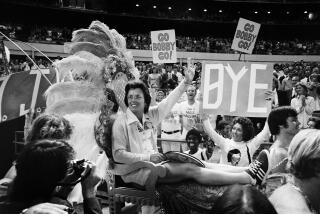Strength Is Virginia Glass’ Great Ally--On and Off the Tennis Court
- Share via
Virginia Glass, a 60-year-old grandmother of two, walked off a tennis court Saturday at Lindborg Racquet Club in Huntington Beach as the world champion in her division--women’s 60-and-over.
Was she thrilled?
“Oh, hardly,” Glass said with a quiet laugh. “It just means I had a little more stamina today.”
Don’t let her fool you.
The San Diego resident had to survive a seemingly endless arsenal of drop shots and corner shots before finally defeating her opponent, Doris Clark of Laguna Beach, 2-6, 7-5, 6-3, in the women’s 60-and-over final of the International Tennis Federation Veteran Championships.
Her victory--coming just a day after a 3 1/2-hour, 6-1, 6-7, 6-1, semifinal victory over Marcelyne Blom of Holland--was somewhat an act of survival, both physical and mental.
“I’m a strong horse,” Glass said. “I’m a very strong person.”
There are many reasons for this, though some have little to do with tennis.
Born in the Philippines, Glass remembers little joy during her adolescent years. In December 1941, the Japanese invaded Manila, and she and her family were placed in a Japanese internment camp.
Glass and her family were kept there three years, during which Glass could only watch as her father and two sisters died of starvation.
After U.S. forces defeated the Japanese in the Philippines in 1944, Glass and the rest of her family were repatriated to the United States.
They settled in New York, and Glass, who received a scholarship to study at the American university of her choice, entered Columbia University as a 16-year-old English and journalism major.
“When I was in the camp, my refuge was in books,” Glass said. “I loved to read. That’s how I survived. That’s how I kept on.”
And it’s also how she came to play tennis.
Glass said she first took an interest in the sport at 30, after seeing some tennis footage in the 1951 Hitchcock thriller, “Strangers on a Train,” a film concerning a professional tennis player.
“I said to myself, ‘Oh, don’t those people look great in those little white outfits,’ ” she said. “I wanted to be a part of it.”
So, having earned a master’s degree in library science, Glass went to the card catalogue and looked it up. “Being very book-oriented, I learned everything from books,” she said. “I never once took a tennis lesson.”
While she taught herself about the secrets of topspin and serve, Glass involved her two sons, Sidney and Luis, then 7 and 8. They went on to be ranked No. 1 and No. 2 in their age groups in the Eastern Tennis Assn., Glass said.
“I felt every child should have something that he could excel in, be it tennis or baseball or education,” Glass said. “They both loved tennis, and they did very well, so together we learned.”
Luis, now a teaching pro in San Diego, went on to be an All-American at UCLA. Sydney, a lawyer in Marin County, played tennis at the University of Wisconsin during his freshman year--”until he discovered civil rights,” Glass said.
Perhaps Sidney Glass took after his mother. Virginia Glass is listed in “Who’s Who Among Black Americans” for her lifetime community service in various minority organizations.
Today, most of that involvement concerns tennis. Glass is the past president of the American Tennis Assn., an organization formed in the 1940s to promote and develop tennis for minorities. Current professional players Zina Garrison and Lori McNeil were once part of the ATA program, Glass said.
Glass, who works with the National Junior Tennis League, spends much of her time developing junior tennis players, especially in the southeast sections of San Diego.
“I try to stay as involved as possible--especially with kids,” Glass said. “We’ll go to the public parks, where the kids are. Sooner or later, instead of throwing bottles or cans on the court, they’ll start asking to play.
“As far as tennis goes, I’m over the hill. But working with juniors, well, that’s my reason for staying (in the sport).
“If I could steer some kids in the right direction--not so that they’re great players, but just so they could go through college--well, that’s my main thing right now. That’s what I’m trying to do.”
More to Read
Go beyond the scoreboard
Get the latest on L.A.'s teams in the daily Sports Report newsletter.
You may occasionally receive promotional content from the Los Angeles Times.










